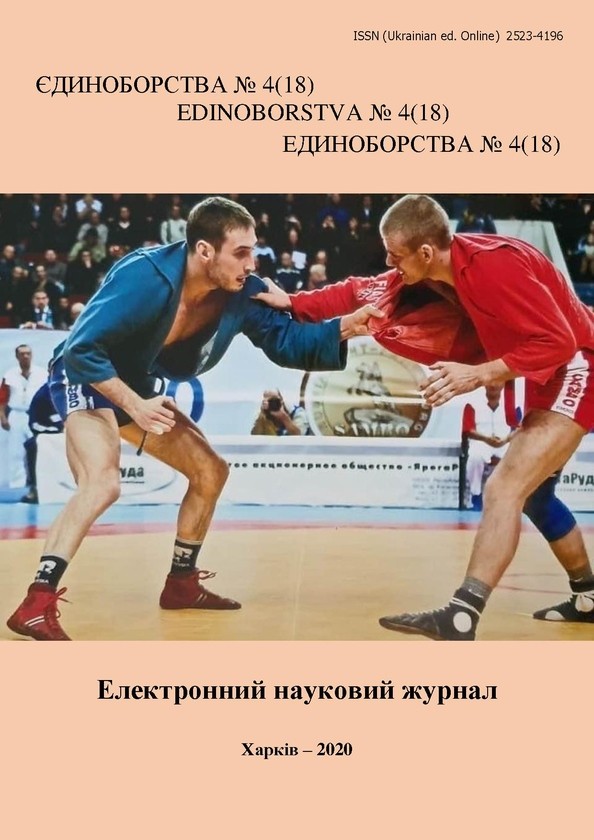Research of the problem of professional development of judo judges
DOI:
https://doi.org/10.15391/ed.2020-4.08Keywords:
judo, questionnaire, refereeing, judges of the national category, referees of the first category, criteriaAbstract
Purpose: using a questionnaire to investigate the problems of raising the professional level of judo judges. Material and methods. During the study, the following methods were used: theoretical analysis and generalization of literary sources and Internet data, pedagogical research, questionnaire survey, generalization of theoretical and practical experience of specialists in the field of combat sports, methods of mathematical statistics. A questionnaire survey of judo judges was conducted. The study involved 30 judo judo national category (19 people) and the first category (11 people). Results: An analysis of the survey of judo judges revealed that a judo judge must have a certain charisma, as 94,7 % of judges of the national category and 100 % of judges of the first category think. 84,2 % of judges of the national category and 72,7 % of judges of the first category believe that they feel quite confident in a difficult situation on the mat. 36,8 % of judges of the national category and 81,8 % of the first category believe that psychological circumstances affect refereeing, but 63,2 % of the judges of the national category answered «no» to the fact that they already have more experience in refereeing and judge more confidently than the judges of the first category categories. 100 % of the national judges and 100 % of the first category believe that the analysis of the assessment according to the criteria will improve their judging. 100 % of the judges of the national category and 100 % of the first category believe that the assessment of their judging should be broken down into separate criteria. 89,5 % of judges of the national category and 100 % of the first category answered that they do not always understand by what criteria their refereeing is assessed. 94, 7% of the judges of the national category and 100 % of the first category believe that their refereeing does not improve after they know the overall mark for the refereeing, since the overall mark does not indicate what mistakes need to be worked on. 63,2 % of judges of the national category and 90,9 % of the first category believe that their judo judo is assessed not entirely objectively. 100 % of judges of the national category and 100 % of the first category believe that it is necessary to constantly improve their professional skills in judo judo. Conclusions. Thus, according to the results of work in judo competitions, judges are given marks in accordance with the criteria of activity. An analysis of the results of a survey of judges of the national and first categories showed the need to develop recommendations regarding the expansion of the criteria for evaluating judges by performance indicators at competitions, identifying the causes of errors of judges while working on the mat.
References
Валеев, Р. Р. (2014). Использование современных технологий в судействе по дзюдо. Молодежь XXI века: потенциал, тенденции и перспективы, Т. 1, 77-79.
Венглинский Г. П. (1998). Отбор судей по спортивной борьбе к соревнованиям высокого ранга. Дис. ... канд. пед. наук : 13.00.04 : Москва, 19.
Евтифиев, А. С. (2016). Подготовка арбитров в спортивной борьбе. Слобожанський науково-спортивний вісник, (1), 26-29.
Клеандров, М. И. (2011). О стратегии совершенствования механизма судейской ответственности. Вестник Тюменского государственного университета. Социально-экономические и правовые исследования, (3), 8-16.
Красненкова, О. С. (2018). Судейская практика в секции дзюдо как метод допрофессиональной подготовки спортсмена. Вестник научных конференций No 11-2, 76-77.
Мкртчян, А. В. (1986). Содержание и методы формирования судейских функций у студентов институтов физической культуры специализирующихся по спортивной борьбе. Автореф. дис. ... канд. пед. наук. ГЦОЛИФК. - М., 24.
Положення про Суддівську Комісію (2014). Суддівський Корпус Федерації дзюдо України та присвоєння суддівських категорій.
Трофимов, А. И. (2002). Критерии оценки и методика подготовки судей по дзюдо. Дис. ... канд. пед. наук 13.00.04. РГАФК. - М., 144.
Ушенин, А. И., Оруджев, А. М., & Арсеньев, В. А. (2017). Требования, предъявляемые к оценке (судейству) боевых приёмов борьбы. Современные тенденции развития науки и технологий, 105.
Федоров, В. И., & Коричко, Ю. В. (2017). Критерии и оценка личностных качеств спортивных судей в дзюдо. Направления в области физической культуры, спорта и туризма, 268.
Чукров, Н. З. (2017). Проблема судейства в борьбе хапсагай (соцопрос). Актуальные вопросы развития и научно-методического обеспечения национальных видов спорта и народных игр Республики Саха (Якутия), 399-402.
Шевцов, А. В. (2017). Проблемные аспекты судейства соревнований по спортивной борьбе. Совершенствование системы подготовки кадров по единоборствам, 38-43.













